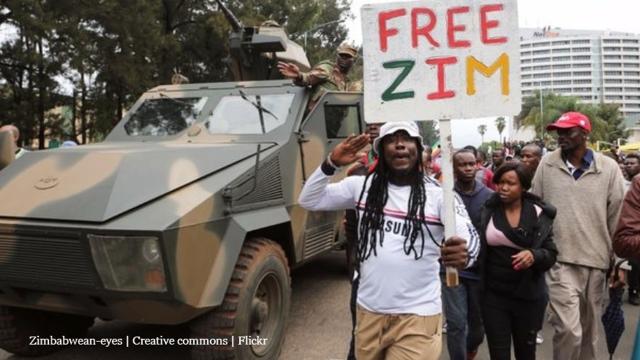Zimbabwe will hold elections on July 30, 2018, according to CNBC. The European Union will oversee it. Voa News said that President Emmerson Mnangagwa made the announcement. But, as the award-winning journalist, Hopewell Chin'ono, pointed out, it's not just the EU or the UK who need to come on board for these elections. The United States is going to be crucial.
On Twitter, he posted, "Zim needs the US onboard because all significant major financial transactions go via New York. Bob [former president Mugabe] was reduced to moving around with cash.
The Zim government has an opportunity to resolve issues but time is running out."
5/ Zim needs the US onboard because all significant major financial transactions go via New York. Bob was reduced to moving around with cash. The Zim government has an opportunity to resolve issues but time is running out. This busy might be that moment @ZimMediaReview @matigary
— Hopewell Chin'ono (@daddyhope) June 1, 2018
Zimbabwe elections and the sanctions stance of USA Senator
In May, CGTN Africa reported that "a leading U.S. Senator on African affairs said President Emmerson Mnangagwa is running out of time to take steps which could lead to sanctions relief for Zimbabwe." Speaking to Senator Chris Coons, who led a delegation to Zimbabwe, it came out via Chinese television, that President Emmerson Mnangagwa's "Open for business" stance was initially very welcome.
At the time, Coons was "delighted to have terrific conversations with President Mnangagwa." In a later editorial and in a press conference, the Honourable Mnangagwa clearly committed himself to democracy, Coons said. But he later went on to say that the country is running out of time to stop talking and start making real changes ahead of the elections. These included things like free and fair elections, a return to "rule-based economy" and improved "Human rights."
Coons also said if these and other actions were taken that Zimbabwe could expect the USA to give the country "significant sanctions relief." Coons and Senator Flake were keen to take this to Congress to push it through. But at the end of it all, Coons made it clear that they felt there had not been enough done.
This was despite real action happening in terms of improvements for voter registration and the electoral roll.
US continuation of sanctions will hurt the new age of prosperity
This does not bode well for Zimbabwe, as the elections are less than two months away. On the ground in Zimbabwe, there are conflicting opinions on a prosperous future between all races and class. Positive steps like starting to return some farms to dispossessed whites and talking about compensation have hardliners upset. But business people seem to be optimistic and there are many negotiations going on in Zimbabwe at present. One such construction company owner told me that in fact, there are enough interested parties that the country may not need US business investment initially.
But another Zimbabwean who returned from the diaspora who is looking to invest said that the US is vital for the improvement in the economy of the country. The infrastructure like roads, railways, and healthcare all need massive injections of money. If the USA keeps sanctions that will in effect mean a withholding of capital as well.
There are also unconfirmed reports via Hopewell Chin'ono who is well connected to international media, that "the Africa Bureau Acting Deputy Assistant Secretary for the US government, Matthew Harrington will be in Harare. He has got a two-day program from the 7th up to the 9th of June." He added that the US seems to still have problems with Zimbabwe.
1/ My contacts in Washington DC tell me that the Africa Bureau Acting Deputy Assistant Secretary for the US government, Matthew Harrington will be in Harare.
— Hopewell Chin'ono (@daddyhope) June 1, 2018
He has got a two day program from the 7th up to the 9th of June. They hev issues @ZimMediaReview @matigary @sure_kamhunga
The Mail & Guardian's Joe Devanny wrote an interesting analysis on what the UK could expect from the Zimbabwean elections.
He pointed out a range of potential ways the elections could be unfair. He wrote, that there are "more than fifty shades of grey between, on the one hand, free and fair elections, and, on the other, total dictatorship."
He went on to point out that it takes years to uncover and prove any meaningful election rigging. This may be why the USA appears to not be overly impressed with what has been done so far, or the fact that the EU will oversee the elections.
The 'bloodless coup' and unity
In Zimbabwe, November 2017, millions of people rushed into the streets to welcome and embrace the military who made the outsing of long-term president Robert Mugabe. In the days that followed the "bloodless coup," Zimbabweans, possibly for the first time since their 1980 independence from Rhodesia, united and danced together in the streets.
But inevitably, with the breath of fresh air that Mnangagwa brought, instead of using the long-lost freedom of speech to pursue a unified, and dignified way forward, a lot of sniping and squabbles arose among various opposition parties and civic leaders.
Zimbabwe's election will not be won through social media
The bottom line is that many of the opposition parties and civic movements have focussed on getting their message out via social media. This election will not be won by the diaspora liking and commenting on posts. It will not be won by those in Zimbabwe sniping at each other on Twitter. It will, at the end of the day, be won by those parties who take their campaigns to the rural areas.
ZANU PF knew this when their military resistance against Rhodesia expanded in the 1970s and they have used it ever since, to win hearts and minds.
This election will be no different. The USA should know this. It is not the fault of the average rural person in Zimbabwe that ZANU is well set to campaign in those areas. The poor rural people, like everyone else, want to see prosperity and that will only come if all international governments back the elections if they are declared free and fair by the EU.


